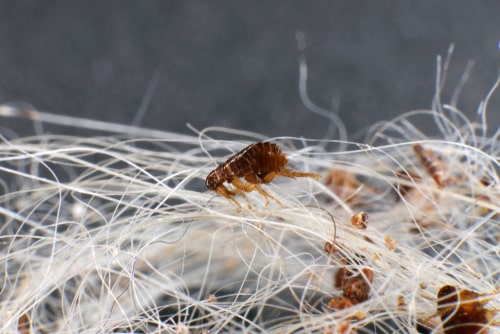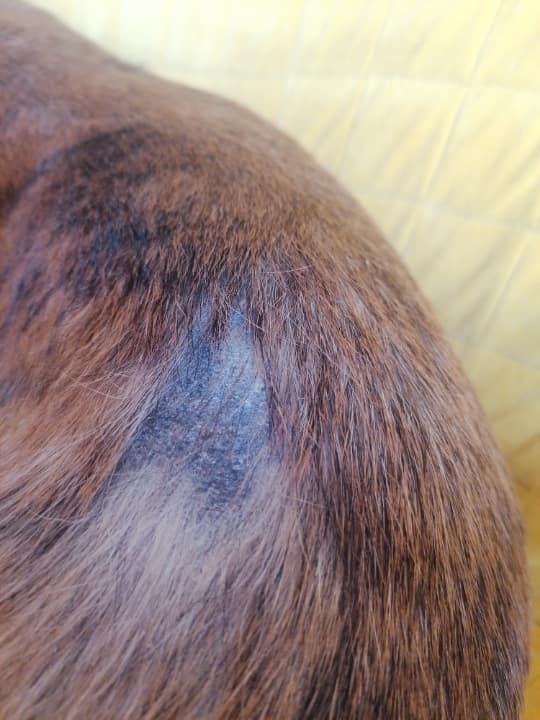Skin issues rank as one of the top reasons why pet owners seek veterinary advice. What begins as an occasional itch can soon escalate into excessive scratching, hair loss and a decline in their well-being. Luckily, there are many things you can do at home to help keep your dog’s coat in good condition and prevent common causes of skin disease.
Why is my dog so itchy?
The two most common causes of itchy dogs are parasites and allergies.

Common parasites found in dogs in the UK include fleas, ticks, mange (mites), ear mites, and ringworm.
Among these, fleas are the most common, and contrary to popular belief, we see them all year round. In addition to itchy skin, other indications of a flea infestation include hair loss, especially along their back and tail, red spots and black dirt in their fur and bedding. Some dogs don’t show any signs of having fleas!

And it’s not only fleas that are very common, but allergies to fleas too.
Dogs have three main types of allergies: parasites, food, and environmental. To make things even more complicated, they can have allergies to all three of these things at the same time.
Environmental allergies can be due to allergens they come into contact with on a daily basis, like pollen, dust, grass and mould. Signs of allergies include ear infections, bald patches, and red and thickened skin. Some dogs may also only show signs of allergies during certain seasons of the year.
Other causes of itching in dogs include anal gland disease, pain and hot spots.
How do you know if your dog is itchy?
Not sure if your dog is itchy? It’s an instinct for dogs to hide signs of weakness or illness to avoid predators targeting them. So it’s not always obvious to owners that their dog is ill until the symptoms are more severe or difficult to hide.
Things to look out for
When dogs are itchy, they may show one or more of the following signs: scratching, licking, chewing or biting. You might also see bald patches or areas of hair thinning.

We recommend checking your dog over at least once a week. Part the hair and assess their skin for any dandruff, black spots, rashes, bumps or anything else that looks abnormal. Look inside their ears for any wax or redness.
If your dog shows any signs of being itchy or you notice any lesions on their skin, download the app and call one of Joii vets right away.
What can I do for my itchy dog? Can I give them anything?
First of all, try to assess what areas of their body are affected. This can help narrow down the potential causes.
Fleas and flea allergies tend to affect the area on their back, where the hips are and down the hindlegs. Contact allergies tend to affect the paws and the underside of the body.
Sporadic itching in dogs can often be managed effectively at home through a combination of treatments. A multi-modal approach involves a combination of anti-bacterial and soothing mousses or gels, along with skin supplements to improve the skin barrier. It’s important to prevent self-trauma; you can do this by using a buster collar or pet medical suit.
Preventative skin care is important too:
- Keep your dog (and all other pets in the household) up to date with flea preventatives: these must be used according to package guidelines.
- Make sure to reduce any home irritants where possible: dust as often as possible, avoid strong aerosols and regularly clean your dog’s bedding.
- Brush your dog regularly and check for any abnormalities in the skin: picking up problems early can improve the response to treatment.
- Feed your dog high-quality food that’s suitable for their age, lifestyle and any health problems they have.
Our Joii vets are available 24 hours a day for advice. We can help advise on products to use at home to help your itchy dog. Download the app and speak to a professional.
What not to do when your dog is itchy
Avoid using products that are commonly recommended on the internet like olive oil, coconut oil, baking soda, and apple cider vinegar, until you speak to a vet. While often touted as remedies, these products may not always be suitable and could potentially exacerbate certain conditions.
Do not let your dog lick, scratch, or bite themselves excessively. Especially in areas where you see abnormalities of the skin. This is called self-trauma. It can make the problem much worse, causing a severe secondary infection.
When to see a vet if your dog is itchy
Some itchy skin can be treated at home. However, other cases may need prescription medication. If your dog is constantly scratching themself. It has gotten so bad that it stops them from their normal routine. Or if their skin looks infected (moist and smelly) or they are lethargic and not eating, then it is time to see a vet.
If you are unsure, download the app and speak to one of our Joii vets. If the problem cannot be treated at home, then we can direct you to your local vet.











